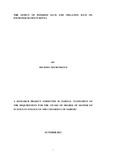| dc.description.abstract | The study sought to understand the effects of interest rate and inflation rate on
exchange rates in Kenya. There are many factors that affect the exchange rate in
Kenya and elsewhere in the world, but the study keenly was interested in
understanding the relationship between interest rates and inflation rates on exchange
rate-in Kenya. The development of literature was guided by Interest Rate Parity (IPR)
Theory, Purchasing Power Parity (PPP) Theory and The Balance of Payments Theory.
The descriptive research design was used in this study. Kenya Bureau of Statistics
(KBA) and the Central Bank of Kenya were used as sources of information in the
pursuit to establish the effects of interest rate and inflation on exchange rates in
Kenya. The study used inflation rates in Percentage, interest rates in percentage and
average annual exchanges rates from 20007 -2012. Multiple linear regression was
used to model the relationship between two explanatory variables and a response
variable was used by fitting a linear equation to observed data. Multiple regression
analysis was also used to assess whether confounding exists. The study further used
Test of goodness of fit and the explanatory power of the model R2
, F test ANOVA
and also test of Multicollinearity. The study found that the co-efficient of multiple
determinations R-square value was O. 871; this meant that the chosen variables
specifically inflation rate and interest rates in Kenya during year 2007-2012 affect the
exchange rate by 87.1% and therefore 12.9% effects of exchange rate ~ssociated
with other unexplained factors. The regression results also indicate that the
relationship between inflation and interest rates against exchanges rates is very
significant at 0.05 level of significance level with a p-va1ue of 0.016. The study
finally concluded that increase in interest rate is necessary to stabilize the exchange
rate depreciation and to curb the inflationary pressure and thereby helps to avoid
much adverse economic consequence. The study recommends that regulators should
come up with means to evaluate exchange rate volatility. It was further recommended
that given specific context of developing countries like Kenya, of significant shocks
from the exchange rate to inflation and the limitations related to monetary policy,
controlling exchange rate volatility is very important in the fight against inflation. | en_US |

